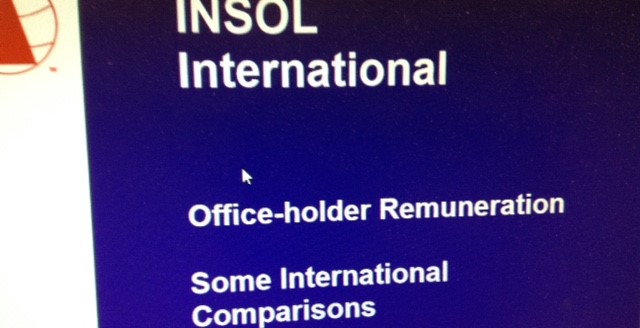NZ insolvency reform – gift cards, director identity numbers, voidable transactions, Ponzi schemes, and more

New Zealand does well in its insolvency law reform, partly assisted by not being a federation (no Linc Energy surprises), and also by not having an upper house of parliament (no Senate inquiries). It also has the benefit, perhaps, of adopting our laws, but at the same time rejecting those aspects of them that are […]
Challenges to trusts by bankruptcy trustees – New Zealand law reform

A recent change to the New Zealand Insolvency Act 2006 (Schedule 1, new para (x)) has given power to the Official Assignee to bring a proceeding challenging the existence or terms of a trust, “even if the bankrupt could not have brought the proceeding if the bankrupt was not bankrupt and even if the bankrupt […]
NSW mines and their potential environmental impacts

In the context of the recent intersections between environmental protection laws and insolvency laws, in relation to CORA laws and Linc Energy in Queensland, and Redwater in Canada, NSW has now revealed concerns it has about the adequacy of funds set aside to meet rehabilitation costs resulting from mining company collapses. The NSW Auditor-General has reported that […]
APES 110 – accountants, whistleblowers and safe harbour advisers to note

Increased professional obligations of accountants, and insolvency practitioners, to refer breaches of the law to the authorities, are being considered at a meeting of the Accounting Professional and Ethical Standards Board (APESB) on 19 May. These have a potential impact by way of leaving whistleblowers with liabilities for which corporate law is yet to consider protection, and in respect […]
INSOL’s Directors in the Twilght Zone – Australia’s “medium risk” for its directors

INSOL International has released the 5th edition of its excellent review of the international laws regulating director conduct in the ‘twilight zone’ of a company’s financial distress approaching or already in insolvency. Australia features well in the report, with interesting views on its assessment of directors having only a “medium risk” of liability compared to its comparable international neighbours. […]
World Bank Report on the Treatment of MSME Insolvencies

The World Bank has just released a report on small business insolvencies – Report on the Treatment of MSME Insolvency, 4 May 2017, (micro, small, and medium enterprises). Much of the Report is relevant to issues being confronted in Australia in this sector. As the Report says, MSMEs are a significant part of the global […]
Protected: ILRA precedents
There is no excerpt because this is a protected post.
INSOL’s Statement of Principles for a Global Approach to Multi-Creditor Workouts

INSOL International has issued a second and updated edition of its Statement of Principles for a Global Approach to Multi-Creditor Workouts, launched at the recent Quadrennial Congress in March 2017. These confirm and support the current Australian reforms for safe harbor protection to assist companies in financial distress. As INSOL says, the world of finance has changed […]
Ethics in the practice of law: a profession, a business or both?

The Australian Academy of Law is holding its second ethics themed Sydney event on Tuesday 20 June 2017, on the question of the law as a profession or a business. An eminent panel of participants in the Australian legal services market will debate the tension between the ancient fiduciary-based ethical principles on which the legal profession is […]
The fees of insolvency lawyers – increased scrutiny under the new law

Liquidators and trustees in bankruptcy are more accustomed to seeing their own fees come under judicial scrutiny than the fees of their lawyers. Legal fees are ‘mere’ disbursements in insolvency law, requiring neither creditor nor court approval. Justice Steven Rares’ recent judicial views about lawyers’ fees in Armstrong Scalisi Holdings v Piscopo [2017] FCA 423 , a […]
Government’s response to the 2015 Productivity Commission Report – “Business … closure”

That part of the Productivity Commission’s report on insolvency – or “closure” – was not one of its better efforts, though it was constrained by being asked to deal with insolvency in what was a broad ranging inquiry, and without a wider perspective offered on the law and practice problems. A number of the Commission’s recommendations […]
Funding personal and corporate insolvency regulation

ASIC and AFSA ASIC The funding of ASIC under the draft ASIC Supervisory Cost Recovery Levy Regulations 2017 by way of proposed levies on liquidators would be calculated according to [the sub‑sector regulatory costs in relation to the liquidator sub‑sector for the financial year minus the product of $2500 and the sub‑sector population in relation to […]
Australian Academy of Law – legal education conference; legal ethics; essay prize; and more

The latest news from the Australian Academy of Law includes: The National Conference on Legal Education, on 11-13 August 2017, in Sydney, sponsored jointly by the Academy and the Australian Law Journal. Registrations are now open. The Academy’s second ethics event, to be held in Sydney, on Tuesday 20 June. The subject is “Ethics in […]
Gift-cards resurrected

The 2016 “gift-card” report of the UK Law Commission examined whether there should be greater protection for consumers who lose deposits or gift vouchers when retailers or other service providers go into insolvency. It made some limited recommendations, none of which have been enacted. Australia’s own 2016 Senate Committee inquiry in Australia into gift vouchers arose […]
Insolvency Law Amendment Bill 2017 (No 1?)

The government is proposing to amend only some of the insolvency law changes under the Insolvency Law Reform Act 2016 that have raised concern. The remuneration approval process now proposed is that if an insolvency practitioner (IP) employs a staff member, and a “related entity” of the IP (their firm) gains from that, and the […]
Unpaid super – just rounding up the usual suspects

A Senate Committee has produced yet another typical report that goes round in the usual circles of recommending the implementation of previous recommendations – director identity numbers, more ASIC and ATO exchanges of information, and more “enforcement” and “resources” for the regulators. These are all the familiar and usual suspects in Committee reports, with pliant media in tow. Reform lies […]
Japanese restaurant’s accountant liable for fair work breaches

The recent court finding that an accountancy firm was liable for contraventions of the Fair Work Act by its client, to which the firm provided payroll services to a client, is indicative of a trend in the law extending and expanding the reach of liability to those who are found to be “involved” in the breach of […]
Freezing orders against alleged phoenixers
The Australian Taxation Commissioner has succeeded in having provisional liquidators appointed to alleged “phoenix” companies associated with a Philip Whiteman. The Commissioner’s case was that the corporate defendants were “collectively operating a business of defrauding creditors involving “phoenix” activities for their clients … the corporate defendants are controlled by Mr Whiteman, who is the de facto […]
Appointing and Remunerating Insolvency Practitioners in Japan: The Roles of Japanese Courts

This excellent review of insolvency practice in Japan provides an instructive perspective for those of us from Western legal traditions, although with familiar and settled insolvency principles clearly evident. The article is written by an Australian expert on Japanese law, Associate Professor Stacey Steele, of the Asian Law Centre, Melbourne Law School. It appears in the […]
Insolvency Law Bulletin – special law reform double issue

The latest Insolvency Law Bulletin (INSLB) is a special insolvency law reform double issue covering various aspects of the changes being introduced by the Insolvency Law Reform Act 2016, as well as further reforms here and in New Zealand. Articles include: Insolvency Law Reform Act 2016: practical implications for insolvency practitioners “While the operation of certain […]
How fixed fees work in insolvency – 1,796 companies at £6000 each = £1600 per company

An English Chancery Court decision has given guidance on the reasonableness of fixed fees in an insolvency, albeit the fees of a corporate adviser acting for companies in assisting with their entry into liquidation. Insolvency practitioners’ remuneration in Australia, and internationally, is generally determined in a time cost basis, one reason being the unpredictable nature […]
INSOL International – Special Report on Insolvency Practitioners’ Remuneration

INSOL International has just published a global review of how insolvency practitioners’ fees are assessed and approved across a range of jurisdictions, including Australia. The opening commentary provides a good summary of the various approaches and their respective merits, followed by more detailed explanations of 14 countries’ fee regimes. Australia is in the midst of insolvency reform […]
Traill’s 16th Insolvency Conference 1-2 May – a wrap-up

A wide range of legal and practice issues concerning the current insolvency law changes under the Insolvency Law Reform Act 2016 were explained and discussed on the second day of the Traill Insolvency Conference, including how to assess reasonable requests for information, what notice must be given to creditors within the opening weeks of the insolvency, […]
Insolvency disclaimer of orphan wells – Linc Energy compared

While Australia is pondering the quirk in its Constitutional referral of powers arrangements which has resulted in Queensland’s environmental protection law being found to prevail over the disclaimer rights of the liquidators of Linc Energy under the Corporations Act, the same issue has just been determined on appeal in Canada. On 24 April 2017, the Alberta […]

